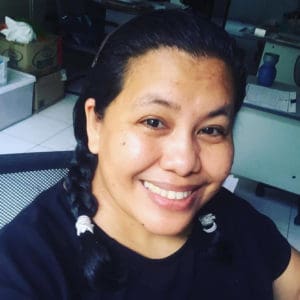Holding Space in Mediation: Member Spotlight: Charmaine Mae Dahapioso-Baconga
“It is quite difficult actually but what we are doing right now… is psychosocial efforts – providing spaces for conversation and focusing on how they have survived.”

Career Path:
Charmaine Mae first connection to MBBI was in 2016, where she participated in the International Peace Training Institute (IPTI) as a part of the South East Asian cohort. The experience of attending the training and the mentorship she received has been invaluable to her work and opened her eyes to the potential of mediation. Since then, she has had a unique career journey making her a dynamic leader within the field of peacebuilding and mediation. She is a teacher by profession; however, initially, when she graduated from University, she wanted to become a pastor. Upon this decision, she was able to engage in an exposure program and was assigned to a community facing armed group issues. What impacted her the most, from this field experience, was seeing a 13-year-old boy holding an M16 rifle. This first-hand experience made her want to work on these issues much more in-depth and embarked on this journey. An opportunity later opened up to work with an NGO focused on community building and mediation. She does not want young people to engage in an armed struggle. Thus, hopes to continue making an impact in this line of work.
Discussing the Marawi Siege
She works in a predominantly Muslim community impacted by the Marawi Siege, at the village level. In 2017, the Islamist militants took over the city of Marawi in the Philippines. Thus, she works with communities closely impacted by the Siege on the island of Mindanao. “Our approach was first, psychosocial support, discussing and providing them spaces for conversations… what has been the impact of the siege for them.” At the same time, her work involves training them in peacebuilding, conflict resolution, and provides some livelihood opportunities. They accompany them with dispute resolution training as well. “I think what I have learned from working with them is that they have their unique ways of resolving conflicts. We know what negotiation is and we have definitions of this but the uniqueness of this context is that they have their own way of resolving conflicts which may include arguments.” Therefore, she has stressed the importance of respecting their own inner conflict resolution culture and process.
Philosophy of Mediation
Charmaine has highlighted that it is important not to impose anything, rather provide different perspectives and engage in training and it is during these trainings, that a greater understanding of mediation and dialogue is introduced. There is an already established Peace Process but this will require time and a focus on community-level conflicts that need to be resolved. She points out that there have been several years of recruiting several young people and a big displacement that should be addressed. Now, in 2020, reconstruction of the destroyed villages and infrastructure is still ongoing but many are still traumatized and suffer from it. She says, “I grew up in that city” and her family friends were impacted by the Marawi Siege condition. She says, “it is quite difficult actually but what we are doing right now… is psychosocial efforts – providing spaces for conversation and focusing on how they have survived.” Holding spaces for them to engage in dialogue and gaining trust has been key in her work. She has stressed that the trust-building process in the community takes time and is still an ongoing process.
Pandemic Implications
Mae believes that working closely with the community in the midst of a pandemic is challenging and will continue to be challenging. She states, “this pandemic knocked us off. I live three hours away from the city I am assigned to so I have been away for three months…my city is one of those who have had high incidents. Thus, how do we communicate and talk to people?” She stressed social media as a tool to help with communication efforts. Furthermore, she has young people in her team as colleagues, which she is currently mentoring and wishes for them to continue the work they are doing right now. She states, “the pandemic has changed the way we all communicate and deal with people therefore; our trainings approach has changed.” Thus, constantly promoting an innovative culture within her organization and self.
Article by Elizabeth Gamarra, MBBI Writer
